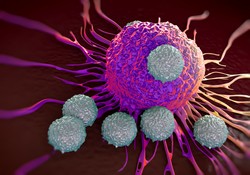T cell anti-tumour immunity restoration
Cancer cells use a variety of mechanisms to evade immune surveillance including secretion of immunosuppressive factors and recruitment of accessory suppressive cell types. Among many immune cell types, CD8+ T cells stand out as critical mediators of anti-tumour immunity. Functionally-suppressed CD8+ T cells often remain in the tumour microenvironment and the ANTITUMOR IMMUNITY project has investigated new key players in the suppression of T cell anti-tumor immunity. The researchers systematically probed the molecules behind dysfunctional anti-tumour T cell responses and explored candidate targets for the development of immune-modulatory therapies. They established scalable experimental in vivo systems for screening and evaluating genes involved in the suppression of anti-tumour T cell responses using a model of acute myeloid leukaemia (AML) and a model of pancreatic ductal adenocarcinoma (PDAC). To identify key genes involved in suppression, they generated T cell focused candidate short hairpin RNA (shRNA) libraries and probed them in multiplexed in vivo RNAi screens. The establishment of a novel bioinformatics analysis pipeline allowed the identification of - in addition to already known modulators of T cell responses - new modulators of T cell responses. Furthermore, the dual setup of the protocol enabled the discovery of shared and tumor type specific mediators of T cell dysfunction. Using their robust screening platform, ANTITUMOR IMMUNITY is currently following up on the multiple functions of genes in the context of anti-tumour T cell immunity. Genes involved in the functional suppression of CD8+ T cells can be evaluated for their suitability as drug targets.







